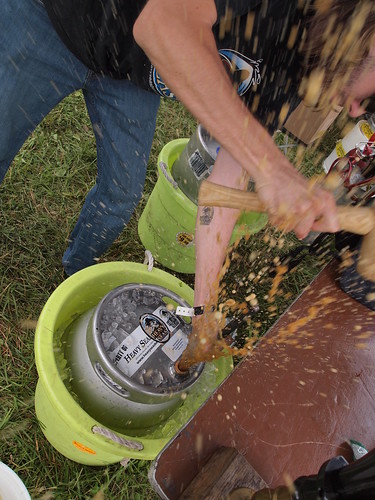Bert Grant was one of the pioneers of the American 'craft' beer industry. A veteran of the 'mainstream' brewing industry, he left that, disenchanted, in 1982, to open the nation's first brewpub, the
Yakima Brewing and Malting Company, in Yakima, Washington. When and where there had been no prior examples, it was Grant who established the brewpub paradigm, including removing government obstacles.

Today's growing fascination with the concept of 'session' beer was predated by decades by
Grant's Celtic Ale, a 3.2% alcohol-by-volume dark bottled beer, with a hefty slug of a finish: 38 International Bittering Units.
(By contrast, Budweiser, containing about 5% alcohol-by-volume, is, maybe, 10 IBUs.) At the same time he was brewing small, Grant was going the other way, creating high-alcohol beers, one of the nation's first
Russian Imperial Stouts, and one of its first 'craft'
IPAs.
Never reticent to promote his beer or resume, Grant was always a feisty showman. Presiding at his brewpub, and elsewhere, attired in a kilt and tam o'shanter, he would challenge:
If you don't like [my beer], drink something else. I make it for me. I don't make it for the masses. But a lot of people seem to like it as well as me.
Grant also took on the Federal Government. As he —and we fellow maltworms— knew, beer is liquid bread. So, he asked, in 1992, why
shouldn't there be nutritional information on beer labels? In answer, he put nutritional specifications on six-pack carriers of his
Scottish Ale.

Unfortunately, the government didn't agree with his assessment.
The
Bureau of Alcohol, Tobacco, and Firearms (BATF) determined that putting nutritional information on a beer label might confuse consumers into thinking that beer actually had nutritional value, just as, say, a
Twinkie might, which is required to have a nutritional label. Specifically: "any reference to vitamin content in the advertising of malt beverages would mislead a substantial number of persons to believe that consumption of the product would produce curative or therapeutic effects." The Bureau ordered him to cease and desist forthwith.
Grant
died in 2001, and his brewpub followed, in 2005. But now, two decades since the original decision, Bert Grant has a new legacy. He's won the argument.
Last Tuesday (28 May 2013), the
Alcohol and Tobacco Trade and Tax Bureau (TTB) —the successor to the the BATF—
ruled that breweries, wineries, and distilleries can indeed put serving size, servings per container, calories, carbohydrates, protein, and fat per serving on their labels. The ruling is voluntary. A brewery (winery or distillery) does not have to do this, but may, if it wishes to.
The distilled spirits industry has longed pushed for this change, but, ironically, breweries (and wineries) not so much. Printing the information would take up valuable 'real estate' on a bottle label and incur additional costs, and they worry that the ruling could become mandatory, as the TTB had proposed in 2007. But the ruling does contain one other significant change that breweries do commend. Labels can also list alcohol content as a percentage of alcohol by volume, rather than as a serving size.
“We applaud the TTB’s conclusion that rules be based on how drinks are actually served and consumed,” said Joe McClain, president of the Beer Institute.
The photo, above, of the
Grant's Scottish Ale nutritional label is re-printed here, courtesy
Lew Bryson (all rights reserved), from a story of Bryson's 1997 trip to Washington hopfields in 1997, which included a stop at
Yakima Brewing and Malting Company, where he met with Bert Grant. If you look closely, you'll see that the photo is actually of a large poster, that Grant had produced after the BATF action. Ever the curmudgeon, Grant had written:
Please note: Publication of this data is banned in the U.S.A. The Bureau of Alcohol, Tobacco, and Firearms has determined that the publication of analytical data on any alcoholic beverage that shows a positive health benefit is illegal. They do not dispute the accuracy of the analysis.
Congratulations, Mr. Grant, and a belated thank you. I think I'll have a nutritional beer for lunch.
-----more-----


.png)




